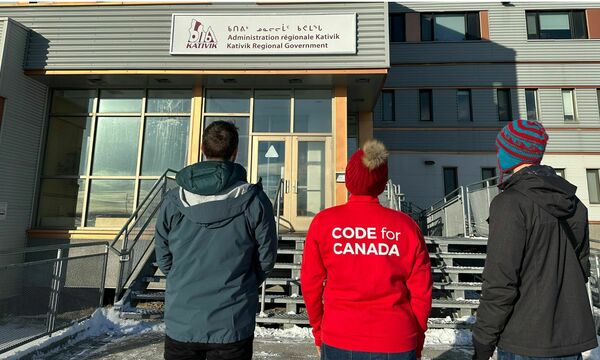Unprecedented: How Canada’s newest civic tech group is helping fight food insecurity
In our Unprecedented series, we’re introducing you to public servants and civic tech practitioners whose work is making a real difference for residents during COVID-19. Chime in on Twitter using the #unprecedented hashtag.

When COVID-19 arrived in Saint John, N.B., Samantha Wentzell knew the virus would have an impact on local food banks and the families that depend on them.
She wasn’t prepared for just how big that impact would be.
“Initially, the plan was to do some take-away lunches,” says the Community Developer for the Horizon Health Network. “But it didn’t take long to see that this was going to require a longer response, and it was going to be necessary to get food to entire families. We also recognized that this was going to reach well beyond the people we normally see accessing services.”
So Samantha began working with a network of 10 nonprofit organizations to streamline food distribution and track emerging needs. They knew a digital tool was required, but their resources were already stretched, and the requirements were complex.
“While we had a a lot of expertise around the table in in program design and delivery, one thing we didn’t really have was a whole lot of expertise in technology,” Samantha said.
So, with a list of needs in hand, she found herself pitching the challenge at a Civic Tech Saint John (CTSJ) hacknight in March.
CTSJ’s official launch was only a few weeks before the crisis forced everyone indoors, and as Canada’s newest civic tech group, they’ve had more hacknights online than in person. After hearing about the nonprofit network’s needs, a handful of CTSJ-goers got to work immediately.
“It’s an interesting challenge from an IT perspective,” says Civic Tech Saint John organizer Ben McHarg, who works as a Cybersecurity Instructor at New Brunswick Community College. “Once we kind of had our requirements defined, we reached out to other civic tech groups, and a lot of good ideas started coming in. But what those conversations really highlighted was that there wasn’t one solution with all the behaviours built in from a software package perspective that would suit our needs.”
To solve this problem in a timely way, CTSJ and the nonprofit network are testing two paths in parallel: one is working with a vendor whose service covers most, but not all, of their requirements. The other is prototyping a custom solution in case option one doesn’t take.
In just a few short weeks, the volunteer team has made some real progress.
“It’s been impressive to me to see the number of volunteers that have gotten involved,” Ben says. “A lot of them are still doing nine-to-five jobs on top of this. We even have a PM who helps keep everything on track because it is quite a wide, diverse team. It’s impressive that we’ve been able to move as quickly as we have to get to this point.”
Even though the emergency food program will eventually close, COVID-19’s long-term impact on the community could make food security a challenge for the foreseeable future. CTSJ is helping Samantha and her colleagues prepare for that, too.
“It’s just been amazing to have a platform like Civic Tech Saint John that we can go to. It’s a huge win for the community,” she says. “They’ve given feedback along the way, not only on potential solutions for this situation, but also on how to improve our current systems.
“The economic impact of COVID could last six months, or two years. We really don’t know, so we’re working very closely within our network and also with other foods service providers so we can transfer this knowledge and this technology to them.”
Learn more about Civic Tech Saint John by connecting with them on Twitter, or dropping into a virtual Tuesday evening hacknight.
You can check out other entries in our Unprecedented series on our blog, or join the discussion on Twitter using the #unprecedented hashtag. If there’s a story you think we should know about, share it here.











